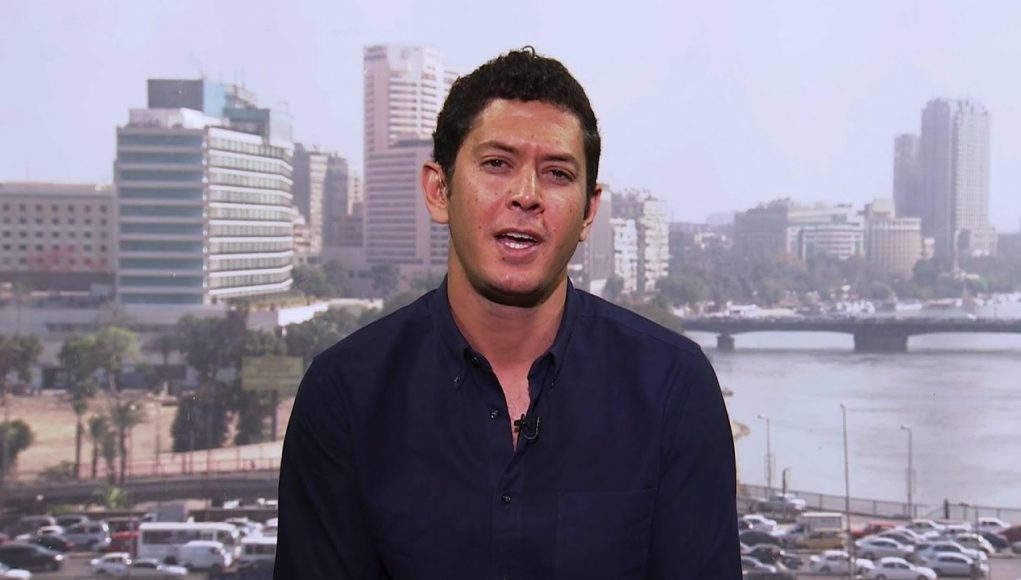This is a transcribed excerpt from a virtual book discussion with Sharif Abdel Kouddous, Jonathan Smolin, translator of I Do Not Sleep (Hoopoe, 2021), and moderator ArabLit blogger Marcia Lynx Qualey.
Independent journalist Sharif Abdel Kouddous talks about his grandfather, the renowned and prolific Egyptian writer of popular fiction, Ihsan Abdel Kouddous, author of the daring 1950s novel I Do Not Sleep, translated to English for the first time by Jonathan Smolin, and published by Hoopoe (2022).
In addition to being a massively popular novelist, Ihsan Abdel Kouddous was also a journalist, one who, in many ways, followed in the footsteps of his mother, Rose al-Youssef.
How do you see your work as a journalist fitting into this family legacy?
I have been able to travel across the Arab world these last ten years in my capacity as a journalist, covering stories, and I am still amazed that wherever I go – Palestine, Yemen, Syria, Lebanon—people are fascinated to learn that I am the grandson of Ihsan Abdel Kouddous when they inquire about my name. So it is incredible that he retains such recognition over thirty years after his death.
More importantly, the more I read about him and my great grandmother, Rose al-Youssef, and how they both used their journalism as a way to challenge authority and instigate change, the more I find myself fascinated with them.
My own identity as a journalist was forged at Democracy Now, an independent news outlet based in New York whose core philosophy is to be truly independent, to shun established orthodoxy, to speak truth to power, and to give voice to the marginalized, and I have always tried to keep those principles in mind in my journalism.
When I read about my grandfather’s and my great grandmother’s lives and their work and how they so closely embodied those principles, it fascinates me. I am nowhere near their stature, talent, or impact, but it nevertheless makes me feel like I am carrying something forward in the family legacy. Sharif Abdel Kouddous
There are so many stories and historical episodes that I find compelling. One that I became obsessed with a few years ago and researched thoroughly, was the case of Hussein Tawfik. He was a young militant, anti-British nationalist, who in 1946 assassinated Amin Osman, a very pro-British finance minister.
Tawfik was arrested, along with a few others who were implicated, and they were part of a very high-profile trial at the time. Tawfik somehow managed to escape from prison at some point and the entire security apparatus in Egypt went looking for him.
The radio was blaring every half hour that there was an LE5000 bounty on his head and also issuing threats that anybody who harbored him was an accomplice in a crime punishable by death.
It was then that my grandfather received a call late one night from a friend asking him to come immediately to meet him. He got into his car and sped through the streets of Cairo, only to find himself face to face with Hussein Tawfik, this man that everyone was looking for, whereupon he offered to hide Tawfik in his house, an incredibly risky thing to do.
He brought him back to his house on Kasr El Aini Street, where he lived with my grandmother, and hid him there. Tawfik slept in my grandfather’s bed for several days and it was only when my grandmother felt that the cook had spotted Tawfik in the bedroom and became afraid that he would be exposed that they called their revolutionary colleagues, and Tawfik was taken to another hiding place.
This story formed the basis of my grandfather’s novel There’s a Man in Our House that was later adapted into a film, a classic of Egyptian cinema, starring Omar Sharif and Rushdi Abaza. The apartment on Kasr El Aini Street where all this happened was recently acquired again by our family and I will be able to visit and see it.
Another nugget I found very striking, and which resonated with me as a journalist, was the story of when my great grandmother Rose al-Youssef handed over the reins of the magazine [Rose al-Youssef] to Ihsan when he was just twenty-six years old.
From a mother to her son, from one generation to the next, entitled “Twenty Years of Waiting,” and in it, she gives a number of points of advice like: Reject arrogance in the face of fame because arrogance is deadly, always be curious and open to learning, consider your conscience before your wallet, fight oppression wherever you see it and be with the weak against the strong, no matter the cost. Sharif Abdel Kouddous
How do you remember your grandfather, the life around him as you were growing up?
He died on January 11, 1990. I was eleven years old at the time and I remember that it was the scale of the funeral that made me understand for the first time how prominent a figure he was. I remember they closed down Gabaliya Street, in Zamalek, in front of the building where he lived and I stood in the receiving line with my father, uncle, cousin, and older brother, and there were just hundreds and hundreds of mourners coming through and shaking our hands. To my eleven-year-old mind that was something quite compelling.
My personal memories of him are fragmented but some of them are indelible. I remember him being a loving grandfather. Before he died, he had suffered a stroke in 1988 and gone to Virginia for a procedure in 1989 that went very badly. He slipped into a coma but after he came back he was much frailer; he appeared to have aged suddenly and very quickly. We were all on a Nile cruise at the end, for New Year’s in 1989. A couple of hours before midnight he suffered a massive stroke and never regained consciousness.
Egyptian Women You Didn’t Hear About Who Broke Barriers in Science





